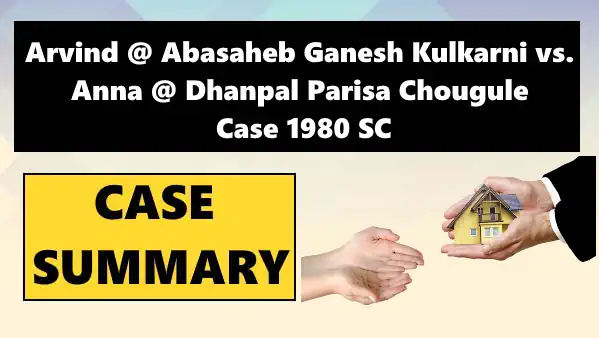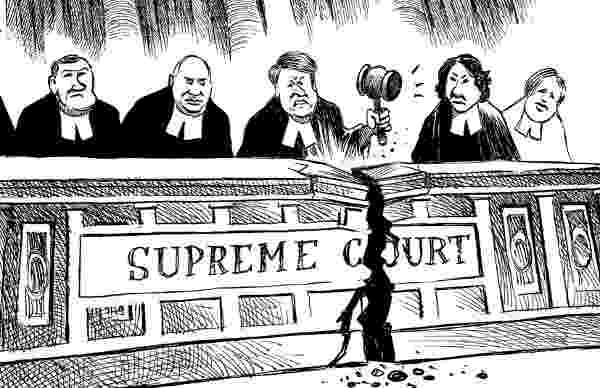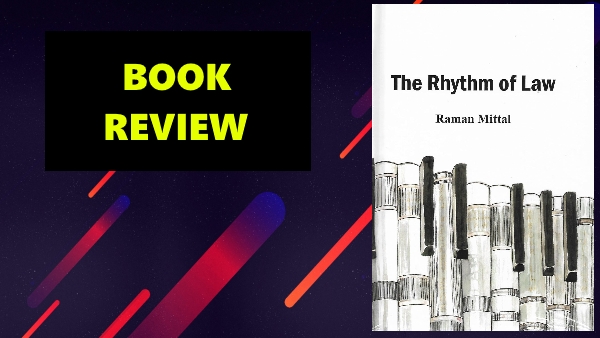Arvind @ Abasaheb Ganesh Kulkarni vs. Anna @ Dhanpal Parisa Chougule case interpreted the meaning of ‘legal necessity’ in selling the ancestral property. When an ancestral property is sold to pay off debts incurred by the father, the fact that a small portion of the proceeds is not accounted for does not invalidate the sale – thus, for alienation to be valid, it must be seen that the consideration received is adequate and that it has been properly utilised, i.e. there was a legal necessity or benefit to the estate.
FACTS:
- Regarding certain lands, a mortgagor issued two deeds of the mortgage in favour of the appellants’ father for Rs. 1600 and Rs. 1000. Although both mortgages were possessory, the land was leased back to the mortgagor for a set rent.
- The mortgagor died, leaving behind three boys, one of whom is an adult and the other two are minors.
- The adult son borrowed a further Rs. 131 by executing a simple mortgage and, claiming to be the joint family’s manager and guardian of his minor brothers, issued a deed of sale in favour of the appellants’ father in respect of four out of ten units of land already mortgaged.
ISSUES:
Whether the sale deed executed for legal necessity?
CONTENTIONS:
- When the minor boys became majors, they filed an action seeking a declaration that the sale deed made was not for legal necessity, nor for the benefit of the estate, and so was not binding on them.
- They also want joint ownership of their 2/3 share.
RATIO DECIDENDI:
- Bench: Reddy, O. Chinnappa (J)
- A decree was issued in their favour, granting them joint possession of a 2/3rd piece of the lands in exchange for payment to the second defendant.
- Following an appeal by the second defendant, the Assistant Judge found the first plaintiff’s claim to be time-barred and changed the decision in favour of the second plaintiff. On appeal by the first plaintiff and the second defendant, the High Court granted the first plaintiff’s appeal and dismissed the second defendant’s appeal.
- In these circumstances, it is difficult to conclude that the plaintiffs were not bound by the transaction.
- The lower courts appeared to believe that, despite the fact that there was a legal requirement to a considerable extent, it was incumbent on the second defendant to prove that he conducted adequate research to convince himself that there was sufficient pressure on the estate to justify the sale.
- When the mortgagee is the buyer and the majority of the proceeds are used to pay off the mortgages, there is no need to worry about the strain on the estate.
- When the ancestral property is sold to pay off the father’s obligations and the majority of the revenues are accounted for in this way, the fact that a tiny portion of the consideration is not accounted for does not invalidate the sale.
DECISION:
- Despite the fact that there was a legal necessity to a considerable extent, the lower courts appeared to believe that it was incumbent on the second defendant to prove that he conducted adequate research to convince himself that there was sufficient pressure on the estate to justify the sale.
- The position expressed by the lower courts lacks foundation in our opinion. We don’t see how any concern of pressure on the estate would emerge where the mortgagee is the purchaser and the majority of the consideration went towards the mortgagors’ discharge.
CONCLUSION:
- The claim was for a particular execution of a sale agreement signed by the family’s manager without consulting the other adult family members. The aim of the sale was not to pay off any of the family’s previous obligations, nor was it to provide any benefit to the family.
- The plaintiff’s main motivation for selling the land was to merge his own holdings. The Court inevitably determined that the intended transaction was neither lawful nor beneficial to the estate, and hence, the deal could not be implemented.
Found Arvind @ Abasaheb Ganesh Kulkarni vs. Anna @ Dhanpal Parisa Chougule Case summary useful? We have a bunch of useful topics from family law that will help you in your preparation here >>> FAMILY LAW
Check out our YouTube Channel for free legal videos >>> LAW PLANET YT





